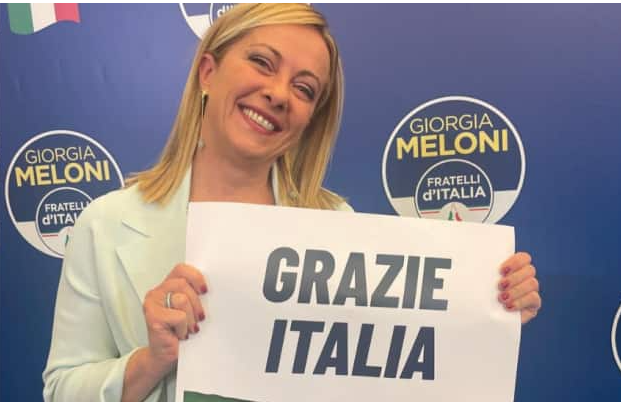
Giorgia Meloni set to be next Italian PM, ushering in most right-wing regime since WWII

Italy is all set to get its first female prime minister with provisional results projecting 26 per cent of the votes in favour of far-right leader Giorgia Meloni.
The news has alarmed Europe as Meloni’s party Brothers of Italy, which has neo-fascist roots, is expected to form the most right-wing government Italy has seen since World War II.
The Brothers of Italy leader who has welcomed the mandate of Italians, however, has assured countrymen that she would form a government for “all Italians” and not break the trust of her people.
“Italians have sent a clear message in favour of a right-wing government led by Brothers of Italy,” Meloni told reporters in Rome on Monday (September 26). A picture of her holding a placard reading ‘Grazie Italia’ (Thank You Italy) has gone viral.
Meloni, 45, is set to bag 26 per cent of the vote, ahead of next rival Enrico Letta from the centre left.
The turnout of the elections, however, fell to a record low of 63.91 per cent, less by nine points since 2018. The final result will be out later on Monday.
Poll projections showed that one in four voters in Sunday’s election voted for Brothers of Italy party. The party has formed an alliance with like-minded outfits to form a majority in Parliament to form government. It includes Matteo Salvini’s far-right League and former prime minister Silvio Berlusconi’s centre-right party Forza Italia. Together, the alliance is expected to get 44 per cent of the votes and get a majority in both the Senate and the Chamber of Deputies.
Even though her party’s fascist antecedents have left EU countries worried, given that Italy is a founding member of the union and Europe’s third largest economy, Meloni has assured that her government would focus more on what unites Italians than what divides them.
“If we are called to govern this nation we will do it for all Italians. We will do it with the aim of uniting people, of enhancing what unites them rather than what divides them,” she told reporters.
Besides reassuring people that the radical past of her party and her own lack of experience in politics wouldn’t hinder her government’s performance, Meloni in the run up to the polls tried to soften her party’s image by expressing her support for Ukraine and minimizing the anti-EU rhetoric even though some of her allies are sympathetic to Russia.
The assurances, however, have not placated critics given her party’s roots in Benito Mussolini’s fascist ideology and her own speech earlier this year in which she had specified her party’s vision if it comes to power.
“Yes to the natural family, no to the LGBT lobby, yes to sexual identity, no to gender ideology…no to Islamist violence, yes to secure borders, no to mass migration…no to big international finance…no to the bureaucrats of Brussels,” she had said.
Meloni has been topping opinion polls since snap elections were called by Prime Minister Mario Draghi after the collapse of his national unity government.
While Meloni’s opinion on EU are similar to that of Hungary’s nationalist leader Viktor Obran, she wants to change the reforms agreed with EU in return for 200 billion euros for post-COVID grants and loans.

